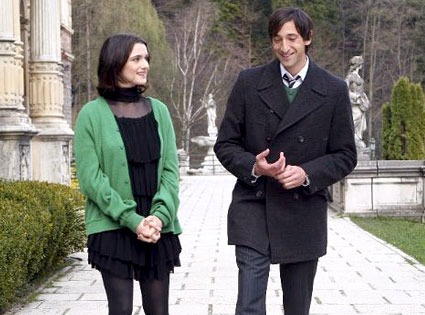 Summit Entertainment
Summit EntertainmentReview in a Hurry: Imagine Dirty Rotten Scoundrels aboard The Darjeeling Limited, and you've pretty much got the idea. This labored quirkapalooza about fraternal grifters planning One Last Con, natch, has moments of charm but fails to pull off its narrative sleight of hand.
The Bigger Picture: Apparently, writer/director Rian Johnson is infatuated with the 1930s. His terrific noir-inspired debut, Brick, followed a teenaged Dashiell Hammett-esque gumshoe in present-day L.A. And for his sophomore effort, Johnson sends swindling sibs around the modern world looking like they've just stepped out of The Sting. Unfortunately, this time out his genre mash-up is more off-kilter than retro-cool.
In a clunky opener, we meet the brothers at a young age. Shuffled between foster homes and inexplicably dressed in Amish wear, they start scamming other kids on the playground. Twenty-five years later, the guys are international con artists—but shopping at the same vintage stores. Ever the instigator, older bro Stephen (Mark Ruffalo) hopes to devise the perfect scheme, while Bloom (Adrien Brody, evoking Buster Keaton with his bowler hat and hangdog longing) yearns to live "an unwritten life."
Eager to retire, Bloom agrees to one last spectacular scheme involving New Jersey heiress Penelope (Rachel Weisz). Bored and lonely, she takes their bait and bankrolls a rather convoluted adventure leading them from Greece to Mexico to Russia to the Czech Republic. But oh, how tangled the web of deceit becomes when Bloom and Penelope fall in love.
Brick succeeded by confining its highly stylized universe to a high-school netherworld. But Brothers—like the brothers—seems led astray by money, with a bigger budget and lots more locations that do the film few favors. Allowed to roam, the story and tone bounce around as much as its anachronistic globetrotters.
Thank goodness for lovely Weisz. In another actress' hands, kooky bazillionaire Penelope might have hit eccentricity overload, but Weisz makes her so sweet, vulnerable, and starved for life that she's disarmingly irresistible. Brothers should have been, too.
The 180—a Second Opinion: A very funny montage showcases Penelope's countless hobbies, from playing the guitar, harp, and banjo to riding a unicycle and juggling chainsaws—at the same time!